Module 6 Problems Unit 1 If I start after dinner, I'll finish it before I go to bed.课件(共33张PPT,内嵌音频
文档属性
| 名称 | Module 6 Problems Unit 1 If I start after dinner, I'll finish it before I go to bed.课件(共33张PPT,内嵌音频 |
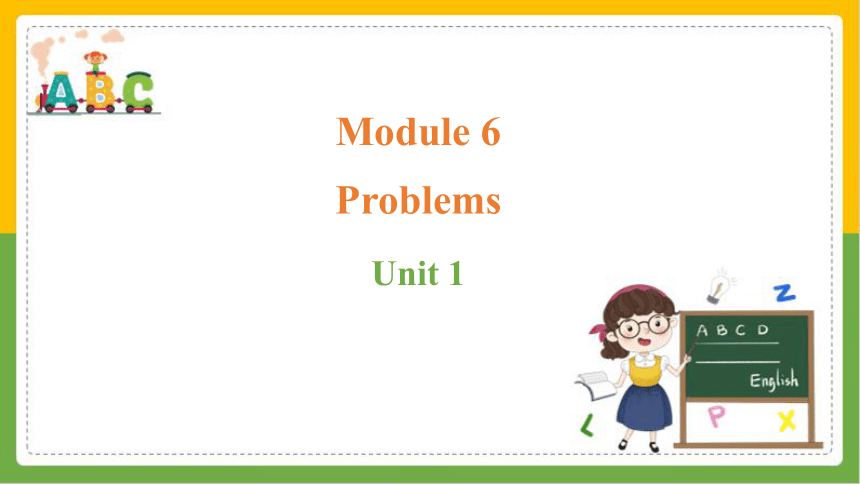
|
|
| 格式 | pptx | ||
| 文件大小 | 5.9MB | ||
| 资源类型 | 教案 | ||
| 版本资源 | 外研版 | ||
| 科目 | 英语 | ||
| 更新时间 | 2024-11-08 03:51:22 | ||
图片预览

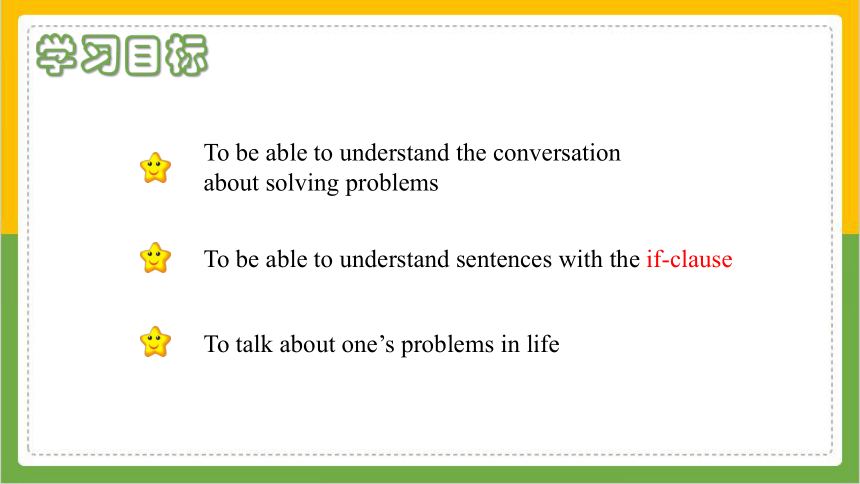
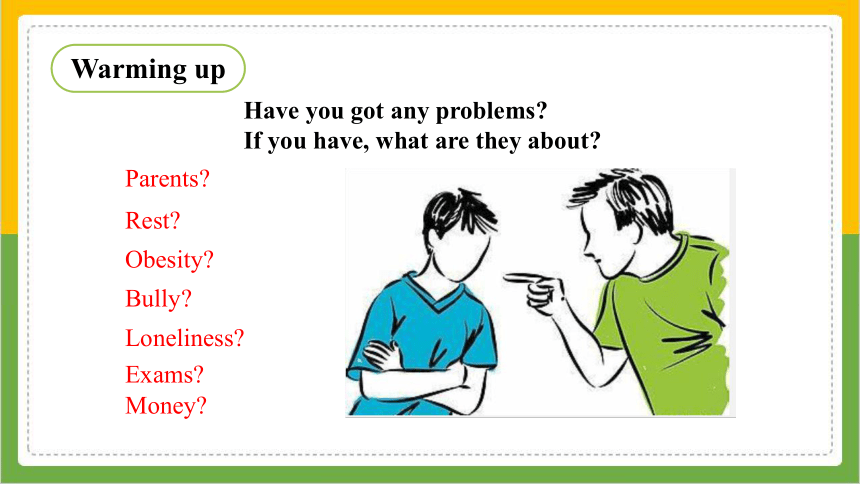
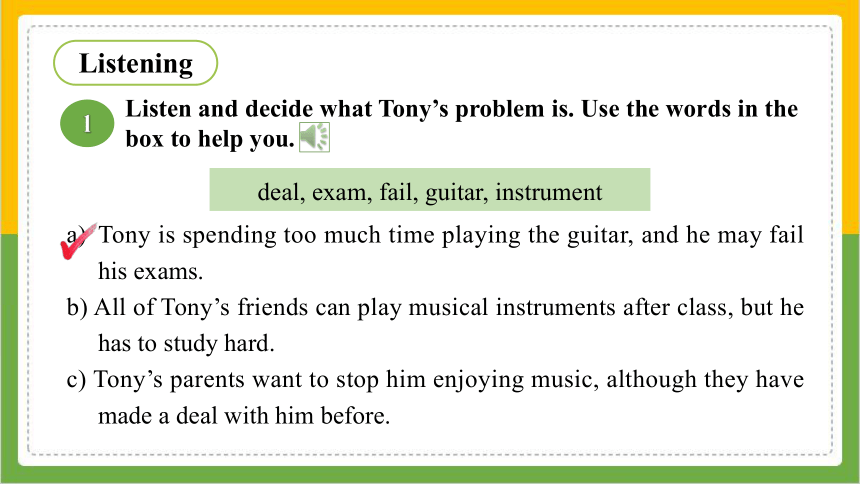
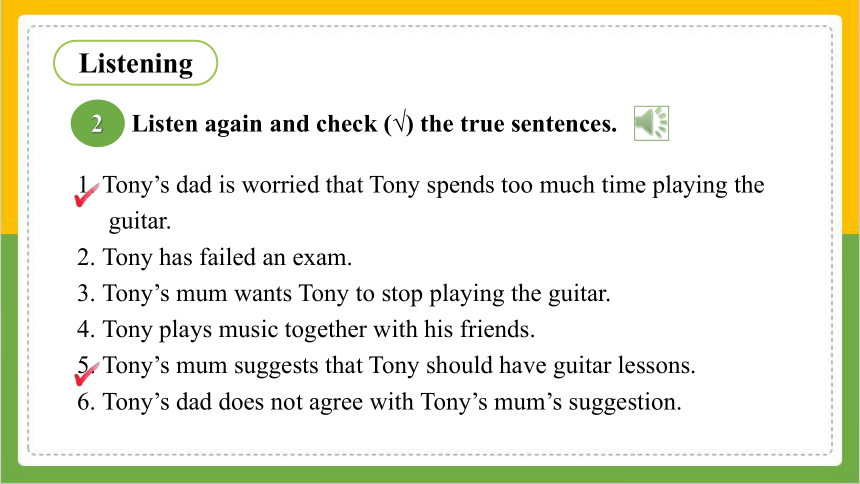
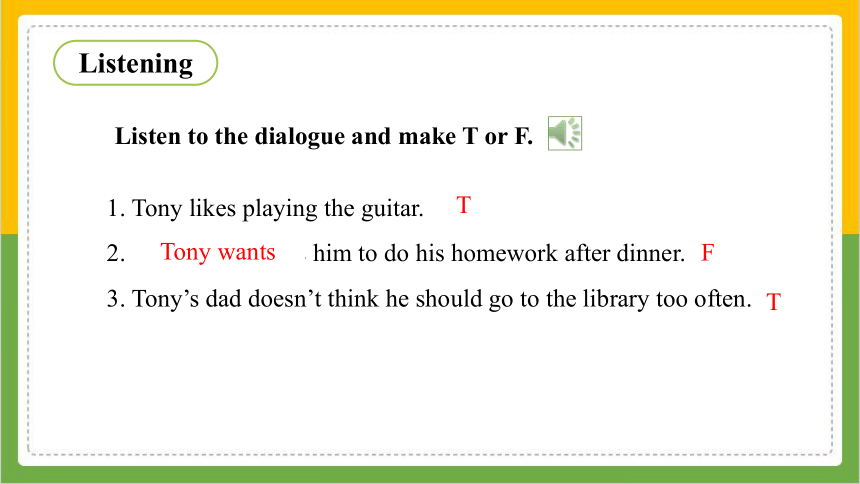
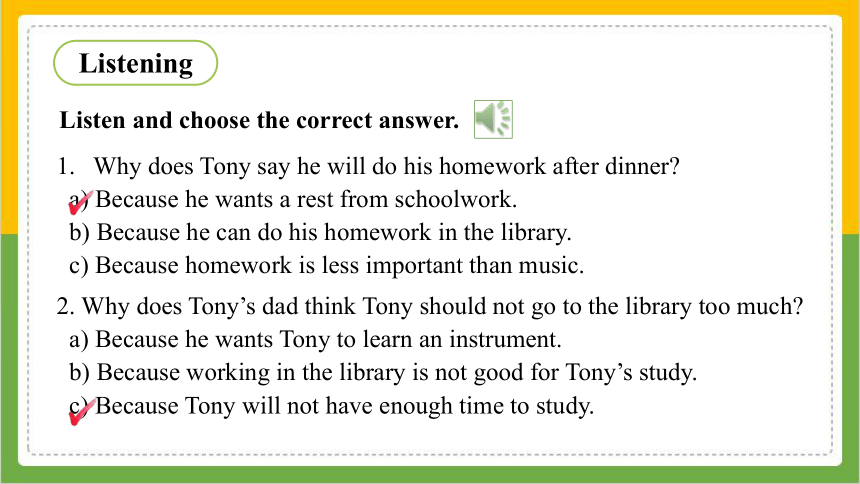
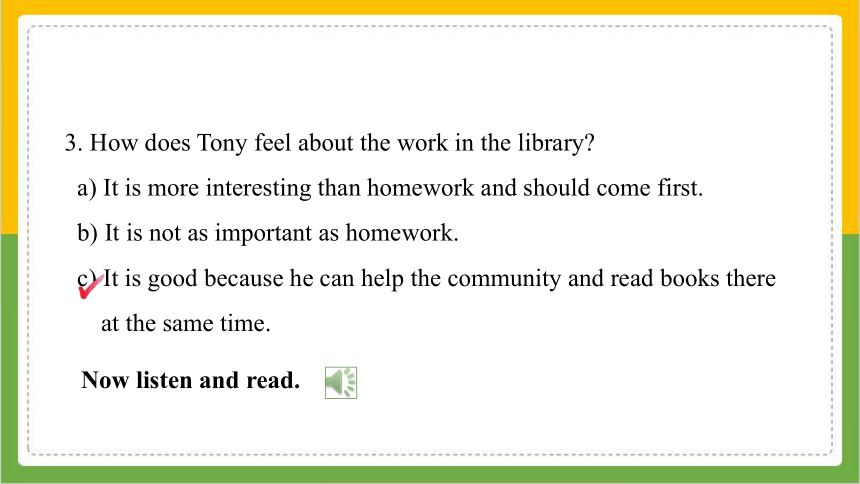
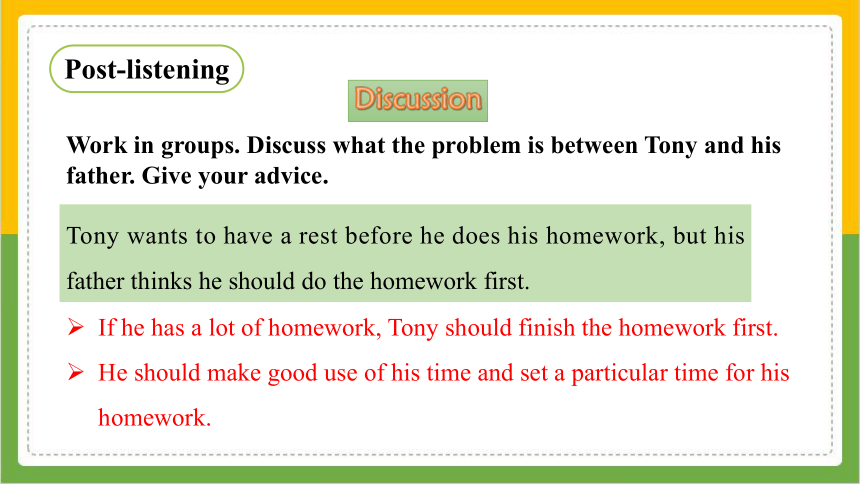
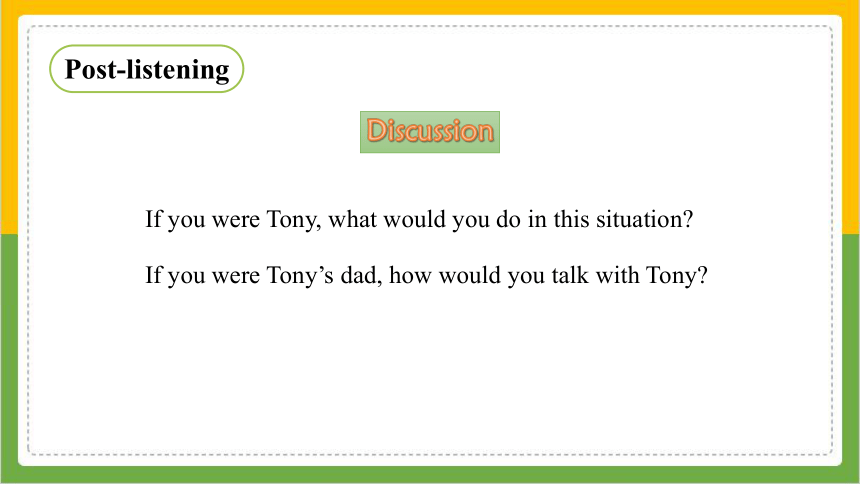
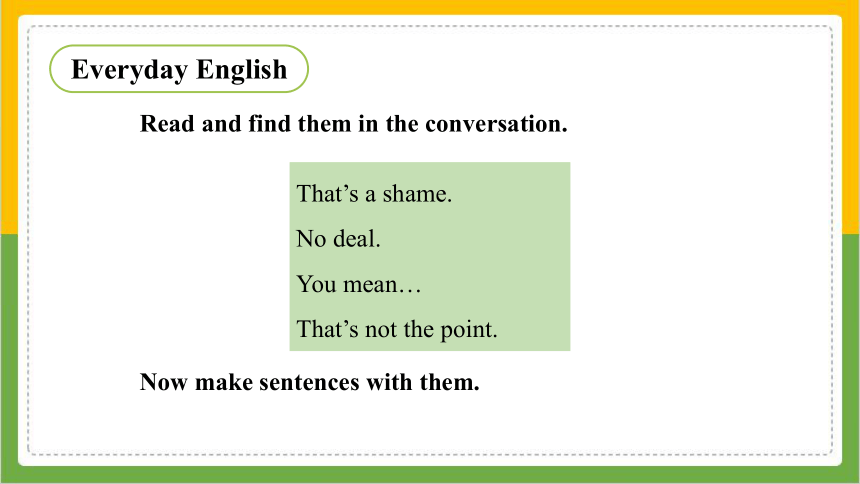
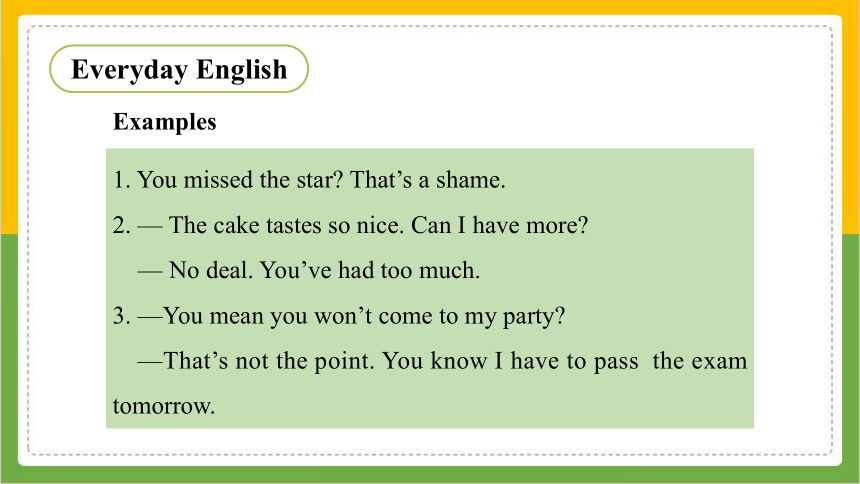
文档简介
(共33张PPT)
Unit 1
Module 6
Problems
To be able to understand the conversation about solving problems
To be able to understand sentences with the if-clause
学习目标
To talk about one’s problems in life
Warming up
Have you got any problems
If you have, what are they about
Parents
Obesity
Rest
Bully
Exams
Loneliness
Money
deal, exam, fail, guitar, instrument
Listen and decide what Tony’s problem is. Use the words in the box to help you.
Tony is spending too much time playing the guitar, and he may fail his exams.
b) All of Tony’s friends can play musical instruments after class, but he has to study hard.
c) Tony’s parents want to stop him enjoying music, although they have made a deal with him before.
1
Listening
1. Tony’s dad is worried that Tony spends too much time playing the guitar.
2. Tony has failed an exam.
3. Tony’s mum wants Tony to stop playing the guitar.
4. Tony plays music together with his friends.
5. Tony’s mum suggests that Tony should have guitar lessons.
6. Tony’s dad does not agree with Tony’s mum’s suggestion.
Listen again and check (√) the true sentences.
2
Listening
1. Tony likes playing the guitar.
2. Tony’s dad wants him to do his homework after dinner.
3. Tony’s dad doesn’t think he should go to the library too often.
T
F
T
Listen to the dialogue and make T or F.
Tony wants
Listening
Listen and choose the correct answer.
Why does Tony say he will do his homework after dinner
a) Because he wants a rest from schoolwork.
b) Because he can do his homework in the library.
c) Because homework is less important than music.
2. Why does Tony’s dad think Tony should not go to the library too much
a) Because he wants Tony to learn an instrument.
b) Because working in the library is not good for Tony’s study.
c) Because Tony will not have enough time to study.
Listening
3. How does Tony feel about the work in the library
a) It is more interesting than homework and should come first.
b) It is not as important as homework.
c) It is good because he can help the community and read books there at the same time.
Now listen and read.
Post-listening
Work in groups. Discuss what the problem is between Tony and his father. Give your advice.
Tony wants to have a rest before he does his homework, but his father thinks he should do the homework first.
If he has a lot of homework, Tony should finish the homework first.
He should make good use of his time and set a particular time for his homework.
Discussion
If you were Tony, what would you do in this situation
If you were Tony’s dad, how would you talk with Tony
Discussion
Post-listening
That’s a shame.
No deal.
You mean…
That’s not the point.
Read and find them in the conversation.
Now make sentences with them.
Everyday English
1. You missed the star That’s a shame.
2. — The cake tastes so nice. Can I have more
— No deal. You’ve had too much.
3. —You mean you won’t come to my party
—That’s not the point. You know I have to pass the exam tomorrow.
Everyday English
Examples
6
Listen and mark the pauses.
Listen again and repeat.
If I start after dinner, I’ll finish it before I go to bed.
If you start now, you’ll finish it before dinner.
If you do all these other things instead of your homework, you won’t have time to study.
Pronunciation and speaking
Sense group & Pause
意群和停顿
有些英语句子比较长,一般是根据意群来停顿。 拿到一个长句子,先要分析结构。 一个句子可根据意思和语法结构分成若干小段,每一小段称之为一个意群。意群可以是一个词,一个词组或短语,也可以是并列句的一个分句或复合句的一个主句、从句等等,我 们可用“/”来划分句子的意群。
状语从句可以放在句首或句末。放在句首时,从句后通常要用逗号; 放在句末时,从句一般不用逗号,每个简短的状语从句分为一个意群,
e.g. I waited/till he came back.
He can’t come/because he is ill.
If he comes,/he will bring his violin.
7
Work in pairs. Talk about the problems you have.
*sports *friends *schoolwork
*your parents *hobbies
Describe the problem and talk about the solutions.
—I failed my maths exam today!
—Don’t worry. If you work harder, you will do better next time.
Discussion
e.g. Study hard, or you’ll fail the exam.
好好学习,否则考试就及格不了了。
I was late because I failed to catch the early bus.
我迟到了,因为没赶上早班车。
1. Tony has failed an exam.
托尼在一次考试中不及格。
fail v. 1) 未能及格,常用于fail (in) sth. (在某方面)失败
2) 失败;未能(做到);未做, 常用于fail to do sth.和fail in sth.结构中
Language points
2. I want you to get into the habit of doing your homework as soon as you come home from school.
我想让你养成一放学回家就做家庭作业的习惯。
habit n. 习惯
get into the habit of doing sth. 养成做某事的习惯
e.g. I have already got into the habit of watching English movies.
我已经养成了看英文电影的习惯。
out of habit 出于习惯
be in the habit of 习惯于…,有…的习惯
break the habit of戒掉某种习惯
change one's habits 改变习惯
fall into a habit 养成一种习惯
拓展
e.g. I only do it out of habit.
我这么做只是出于习惯。
You need to change your eating habits.
你得改变你的饮食习惯。
3. I also want to go to the library to do volunteer work.
我还想去图书馆做志愿者。
volunteer n. 志愿者;志愿兵
vi.自愿做;无偿做;
e.g. Schools need volunteers to help children to read.
学校需要义务工作者帮助儿童阅读。
John volunteered to organize the activity.
约翰自告奋勇组织活动。
e.g. To my shame, I refused to listen to her side of the story.
使我感到惭愧的是,我拒绝听她对事情的解释。
It’s a shame that she wasn’t here to see the truth.
真可惜,她没在这里亲眼看到事实。
4. That’s a shame. 真遗憾。
shame n. 1) [U] 羞耻;羞愧;惭愧
to my shame 使我感到羞愧的是
2) [C]令人惋惜的事;让人遗憾的事,可与a连用
What / It's / That's a shame! (用于交际用语中,表示遗憾)
5. No deal, Tony. 托尼,这不行。
e.g. I never found the missing book.
我一直没找到丢了的那本书。
deal n. 协议 make a deal (with sb.) (与某人)达成协议
常用于情景交际:
Deal! 说定了!
It’ s a deal. 就这么办。
No deal. 这不行。
e.g. --- I'll cook if you do the dishes. Deal
你洗碗我就做饭,可以吗?
--- Deal. / It's a deal.
可以。/ 说定了。
1) deal n. 很多
a good / great deal of (其后通常接不可数名词)
e.g. It took a great deal of time and effort.
那需要花费大量时间和精力。
2) deal v. 处理 (常与with 连用)
e.g. Don't worry, I'll deal with this.
别担心,我会处理这件事的。
拓展
1) —If you finish your homework today, I will go camping
with you tomorrow.
—_______ You can prepare for the camping trip now,
Mum.
A. Deal! B. No way! C. That’ s right. D. Not at all.
A
2) —Jimmy, may I copy your maths paper I don’ t know
how to do it.
—_______! That’s dishonest.
A. Well done B. No deal C. Good idea D. Bad luck
B
6. If you do all these other things instead of your homework, you won’t have time to study. 如果你老是做这些与学习无关的事,你就没时间学习了。
instead adv. 代替;而不是 (位于句首或句尾)
instead of 而不是 (介词短语,后面可接名词、代词、动词的-ing形式)
e.g. She didn’t go swimming. She stayed at home instead.
=She stayed at home instead of going swimming.
她没有去游泳,而是待在家里。
7. That’s not the point. 我不是这个意思。/那不是我想说的。
point n. (试图表达的)观点,看法;某地方;地点; 重点;要点;核心问题
e.g. This is the first point I want to make.
这是我要说的第一点。
Draw a line from point A to point B.
从A点到B点画一条线。
I think I missed the point.
我想我没听懂。
point v. 指向,指
point at / to / towards sb. / sth. 指向某人/某物
point out sb. / sth. / point sb. / sth. out 指出/指明某人/某物
e.g. It’s rude to point at someone’s nose.
指着别人的鼻子很不礼貌。
拓展
8. You should consider what the most important thing is.
但你要权衡哪件事情最重要。
consider v. 考虑;斟酌 常用于 consider doing sth.和consider what / how ...结构中。
e.g. I’m considering changing a job.
我正在考虑换份工作。
Consider carefully before doing anything.
三思而后行。
We should consider what to do next.
我们应考虑下一步该怎么办。
9. I’m sorry, but that’s my last word.
我很抱歉,但这是我最终决定。
last word 最终决定;最后一句话;定论
e.g. It’s probably not the last word on the matter.
这很可能不是最后的结果。
Complete the passage with the words in the box.
Tony wants to go to the library, because he works there to help the (1) ___________. He can also read books there and increase his (2) ___________. But his father thinks it is a (3) _______ that Tony does not (4) _________ his homework to be more important. He wants Tony to get into the (5) _______ of doing his homework first (6) ________ of doing other things after school.
community consider habit instead knowledge shame
community
knowledge
shame
consider
habit
instead
Vocabulary
5
Ask for advice.
Giving advice.
Give comments or thanks.
Problems
课堂总结
(If…, you...)
If you have any problems, be brave to ask for help.
If your friends have problems, be kind to help.
课堂总结
养成……习惯
真可惜;真遗憾
这不行
代替;而不是
考试不及格
最后一句话;最终决定
弹吉他
那不是我想说的。
get into the habit of doing
It’s/That/What a shame.
No deal.
instead of
fail the exams
last word
play the guitar
That's not the point.
1. Listen and read, try to remember the new vocabulary.
2. Work in pairs. Talk about your problems and give advice.
Homework
Unit 1
Module 6
Problems
To be able to understand the conversation about solving problems
To be able to understand sentences with the if-clause
学习目标
To talk about one’s problems in life
Warming up
Have you got any problems
If you have, what are they about
Parents
Obesity
Rest
Bully
Exams
Loneliness
Money
deal, exam, fail, guitar, instrument
Listen and decide what Tony’s problem is. Use the words in the box to help you.
Tony is spending too much time playing the guitar, and he may fail his exams.
b) All of Tony’s friends can play musical instruments after class, but he has to study hard.
c) Tony’s parents want to stop him enjoying music, although they have made a deal with him before.
1
Listening
1. Tony’s dad is worried that Tony spends too much time playing the guitar.
2. Tony has failed an exam.
3. Tony’s mum wants Tony to stop playing the guitar.
4. Tony plays music together with his friends.
5. Tony’s mum suggests that Tony should have guitar lessons.
6. Tony’s dad does not agree with Tony’s mum’s suggestion.
Listen again and check (√) the true sentences.
2
Listening
1. Tony likes playing the guitar.
2. Tony’s dad wants him to do his homework after dinner.
3. Tony’s dad doesn’t think he should go to the library too often.
T
F
T
Listen to the dialogue and make T or F.
Tony wants
Listening
Listen and choose the correct answer.
Why does Tony say he will do his homework after dinner
a) Because he wants a rest from schoolwork.
b) Because he can do his homework in the library.
c) Because homework is less important than music.
2. Why does Tony’s dad think Tony should not go to the library too much
a) Because he wants Tony to learn an instrument.
b) Because working in the library is not good for Tony’s study.
c) Because Tony will not have enough time to study.
Listening
3. How does Tony feel about the work in the library
a) It is more interesting than homework and should come first.
b) It is not as important as homework.
c) It is good because he can help the community and read books there at the same time.
Now listen and read.
Post-listening
Work in groups. Discuss what the problem is between Tony and his father. Give your advice.
Tony wants to have a rest before he does his homework, but his father thinks he should do the homework first.
If he has a lot of homework, Tony should finish the homework first.
He should make good use of his time and set a particular time for his homework.
Discussion
If you were Tony, what would you do in this situation
If you were Tony’s dad, how would you talk with Tony
Discussion
Post-listening
That’s a shame.
No deal.
You mean…
That’s not the point.
Read and find them in the conversation.
Now make sentences with them.
Everyday English
1. You missed the star That’s a shame.
2. — The cake tastes so nice. Can I have more
— No deal. You’ve had too much.
3. —You mean you won’t come to my party
—That’s not the point. You know I have to pass the exam tomorrow.
Everyday English
Examples
6
Listen and mark the pauses.
Listen again and repeat.
If I start after dinner, I’ll finish it before I go to bed.
If you start now, you’ll finish it before dinner.
If you do all these other things instead of your homework, you won’t have time to study.
Pronunciation and speaking
Sense group & Pause
意群和停顿
有些英语句子比较长,一般是根据意群来停顿。 拿到一个长句子,先要分析结构。 一个句子可根据意思和语法结构分成若干小段,每一小段称之为一个意群。意群可以是一个词,一个词组或短语,也可以是并列句的一个分句或复合句的一个主句、从句等等,我 们可用“/”来划分句子的意群。
状语从句可以放在句首或句末。放在句首时,从句后通常要用逗号; 放在句末时,从句一般不用逗号,每个简短的状语从句分为一个意群,
e.g. I waited/till he came back.
He can’t come/because he is ill.
If he comes,/he will bring his violin.
7
Work in pairs. Talk about the problems you have.
*sports *friends *schoolwork
*your parents *hobbies
Describe the problem and talk about the solutions.
—I failed my maths exam today!
—Don’t worry. If you work harder, you will do better next time.
Discussion
e.g. Study hard, or you’ll fail the exam.
好好学习,否则考试就及格不了了。
I was late because I failed to catch the early bus.
我迟到了,因为没赶上早班车。
1. Tony has failed an exam.
托尼在一次考试中不及格。
fail v. 1) 未能及格,常用于fail (in) sth. (在某方面)失败
2) 失败;未能(做到);未做, 常用于fail to do sth.和fail in sth.结构中
Language points
2. I want you to get into the habit of doing your homework as soon as you come home from school.
我想让你养成一放学回家就做家庭作业的习惯。
habit n. 习惯
get into the habit of doing sth. 养成做某事的习惯
e.g. I have already got into the habit of watching English movies.
我已经养成了看英文电影的习惯。
out of habit 出于习惯
be in the habit of 习惯于…,有…的习惯
break the habit of戒掉某种习惯
change one's habits 改变习惯
fall into a habit 养成一种习惯
拓展
e.g. I only do it out of habit.
我这么做只是出于习惯。
You need to change your eating habits.
你得改变你的饮食习惯。
3. I also want to go to the library to do volunteer work.
我还想去图书馆做志愿者。
volunteer n. 志愿者;志愿兵
vi.自愿做;无偿做;
e.g. Schools need volunteers to help children to read.
学校需要义务工作者帮助儿童阅读。
John volunteered to organize the activity.
约翰自告奋勇组织活动。
e.g. To my shame, I refused to listen to her side of the story.
使我感到惭愧的是,我拒绝听她对事情的解释。
It’s a shame that she wasn’t here to see the truth.
真可惜,她没在这里亲眼看到事实。
4. That’s a shame. 真遗憾。
shame n. 1) [U] 羞耻;羞愧;惭愧
to my shame 使我感到羞愧的是
2) [C]令人惋惜的事;让人遗憾的事,可与a连用
What / It's / That's a shame! (用于交际用语中,表示遗憾)
5. No deal, Tony. 托尼,这不行。
e.g. I never found the missing book.
我一直没找到丢了的那本书。
deal n. 协议 make a deal (with sb.) (与某人)达成协议
常用于情景交际:
Deal! 说定了!
It’ s a deal. 就这么办。
No deal. 这不行。
e.g. --- I'll cook if you do the dishes. Deal
你洗碗我就做饭,可以吗?
--- Deal. / It's a deal.
可以。/ 说定了。
1) deal n. 很多
a good / great deal of (其后通常接不可数名词)
e.g. It took a great deal of time and effort.
那需要花费大量时间和精力。
2) deal v. 处理 (常与with 连用)
e.g. Don't worry, I'll deal with this.
别担心,我会处理这件事的。
拓展
1) —If you finish your homework today, I will go camping
with you tomorrow.
—_______ You can prepare for the camping trip now,
Mum.
A. Deal! B. No way! C. That’ s right. D. Not at all.
A
2) —Jimmy, may I copy your maths paper I don’ t know
how to do it.
—_______! That’s dishonest.
A. Well done B. No deal C. Good idea D. Bad luck
B
6. If you do all these other things instead of your homework, you won’t have time to study. 如果你老是做这些与学习无关的事,你就没时间学习了。
instead adv. 代替;而不是 (位于句首或句尾)
instead of 而不是 (介词短语,后面可接名词、代词、动词的-ing形式)
e.g. She didn’t go swimming. She stayed at home instead.
=She stayed at home instead of going swimming.
她没有去游泳,而是待在家里。
7. That’s not the point. 我不是这个意思。/那不是我想说的。
point n. (试图表达的)观点,看法;某地方;地点; 重点;要点;核心问题
e.g. This is the first point I want to make.
这是我要说的第一点。
Draw a line from point A to point B.
从A点到B点画一条线。
I think I missed the point.
我想我没听懂。
point v. 指向,指
point at / to / towards sb. / sth. 指向某人/某物
point out sb. / sth. / point sb. / sth. out 指出/指明某人/某物
e.g. It’s rude to point at someone’s nose.
指着别人的鼻子很不礼貌。
拓展
8. You should consider what the most important thing is.
但你要权衡哪件事情最重要。
consider v. 考虑;斟酌 常用于 consider doing sth.和consider what / how ...结构中。
e.g. I’m considering changing a job.
我正在考虑换份工作。
Consider carefully before doing anything.
三思而后行。
We should consider what to do next.
我们应考虑下一步该怎么办。
9. I’m sorry, but that’s my last word.
我很抱歉,但这是我最终决定。
last word 最终决定;最后一句话;定论
e.g. It’s probably not the last word on the matter.
这很可能不是最后的结果。
Complete the passage with the words in the box.
Tony wants to go to the library, because he works there to help the (1) ___________. He can also read books there and increase his (2) ___________. But his father thinks it is a (3) _______ that Tony does not (4) _________ his homework to be more important. He wants Tony to get into the (5) _______ of doing his homework first (6) ________ of doing other things after school.
community consider habit instead knowledge shame
community
knowledge
shame
consider
habit
instead
Vocabulary
5
Ask for advice.
Giving advice.
Give comments or thanks.
Problems
课堂总结
(If…, you...)
If you have any problems, be brave to ask for help.
If your friends have problems, be kind to help.
课堂总结
养成……习惯
真可惜;真遗憾
这不行
代替;而不是
考试不及格
最后一句话;最终决定
弹吉他
那不是我想说的。
get into the habit of doing
It’s/That/What a shame.
No deal.
instead of
fail the exams
last word
play the guitar
That's not the point.
1. Listen and read, try to remember the new vocabulary.
2. Work in pairs. Talk about your problems and give advice.
Homework
同课章节目录
- Module 1 Wonders of the world
- Unit 1 It's more than 2,000 years old.
- Unit 2 The Grand Canyon was not just big.
- Unit 3 Language in use
- Module 2 Public holidays
- Unit 1 My family always go somewhere interesting a
- Unit 2 We have celebrated the festival since the f
- Unit 3 Language in use
- Module 3 Heroes
- Unit 1 She trained hard,so she became a great play
- Unit 2There were few doctors, so he had to work ve
- Unit 3 Language in use
- Module 4 Home alone
- Unit 1 I can look after myself, although it won’t
- Unit 2 I became so bored with their orders that I
- Unit 3 Language in use
- Module 5 Museums
- Unit 1 Don't cross that rope!
- Unit 2 If you ever go to London, make sure you vis
- Unit 3 Language in use
- Module 6 Problems
- Unit 1 If I start after dinner, I'll finish it be
- Unit 2 If you tell him the truth now, you will sho
- Unit 3 Language in use
- Revision Module A
- Module 7 Great books
- Unit 1 We're still influenced by Confucius's idea
- Unit 2 It is still read and loved.
- Unit 3 Language in use
- Module 8 Sports life
- Unit 1 Daming wasn't chosen for the team last time
- Unit 2 He was invited to competitions around the w
- Unit 3 Language in use
- Module 9 Great inventions
- Unit 1 Will computers be used more than books in t
- Unit 2 Will books be replaced by the Internet?
- Unit 3 Language in use
- Module 10 Australia
- Unit 1 I have some photos that I took in Australia
- Unit 2 The game that they like most is Australian
- Unit 3 Language in use
- Module 11 Photos
- Unit 1 He's the boy who won the photo competition
- Unit 2 The photo which we liked best was taken by
- Unit 3 Language in use
- Module 12 Save our world
- Unit 1 If everyone starts to do something, the wor
- Unit 2 Repeat these three words daily: reduce, reu
- Unit 3 Language in use
- Revision Module B
